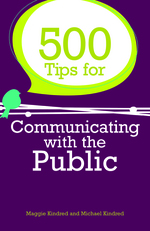 By Maggie Kindred and Michael Kindred, authors of the new book 500 Tips for Communicating with the Public, which addresses the communication challenges that people in the helping professions face in the workplace, covering topics such as managing conflict, assertiveness, feelings, listening and boundaries. It also includes guidance on reflection, supervision, confidentiality and anti-discrimination.
By Maggie Kindred and Michael Kindred, authors of the new book 500 Tips for Communicating with the Public, which addresses the communication challenges that people in the helping professions face in the workplace, covering topics such as managing conflict, assertiveness, feelings, listening and boundaries. It also includes guidance on reflection, supervision, confidentiality and anti-discrimination.
We hope that the advice we provide in our new book, 500 Tips for Communicating with the Public, will help you to do your job more effectively – but it comes with a warning: some bad habits may have to be ditched!
How do people get into these bad habits? Life consists largely of ‘learned behaviour’. We learn everyday skills, like cooking, mainly by example. It is quite possible to get by doing all kinds of things which could be done better. Interestingly, many people decide to have lessons to supplement their cooking, recognizing that their level of competence is perhaps limited – but when when it comes to communication, it does not necessarily occur to us that we could do it better!
At the extreme end of the scale it is obvious that shouting at people, causes distress and does not get the desired result. But how many people do not realize that they are causing offence by:
- standing too close to people?
- writing letters and emails which SHOUT, because of the lettering and style they have used?
- using nicknames and over-familiar modes of address?
Do we perhaps take for granted our ability to communicate effectively? How can we recognize our bad habits in communication and un-learn them?
Hopefully this is where our book comes in. Over the years experts in the helping professions gradually learned what helps and what does not in communication from their detailed observations and analysis of clients’ and patients’ reactions. This collective knowledge is generally thought to make up the tools of counselling and psychotherapy, but we believe that volunteers, carers, public servants and everyone in the helping professions can benefit enormously from learning adapted forms of counselling and communication skills.
This book contains advice for all who work with people on ‘the front line’. With its jargon-free, practical advice, our book brings communication skill development within the reach of all, helping us to break the bad habits of a lifetime acquire some new, good ones!
Here’s a sneak peak at some of the many helpful tips in the book:
One-to-one communication is best in short bursts.
Take breaks when you or your client needs them. No session should be longer than an hour – even this is three times the 20-minute attention span commonly recommended by educationalists. (page 36)Check whether your client prefers information in writing.
It’s preferable to provide information in writing to avoid it being forgotten or misinterpreted. (page 53)Beware of communication running too smoothly.
Things rarely progress without conflict or negotiation…If there’s anger or disagreement under the surface, it needs to be brought up as it can sabotage your work. (page 117)
For 497 more great tips, read 500 Tips for Communicating with the Public!
Copyright © Jessica Kingsley Publishers 2011.
Thanks for sharing the Article its really very informative. Habits, good or bad, make you who you are. The key is controlling them. If you know how to change your habits, then even a small effort can create big changes.
Breaking Bad Habits through communication is the better way.
[External links have been removed from this post by the blog administrator to comply with the JKP Blog comments policy.]